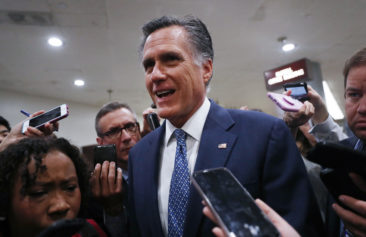Before getting immersed in the Democratic National Convention, it might be worth it to review some of what is in the Republican Party 2012 platform.
The 62-page document is must-reading (as will be the Democratic platform after it is passed this week in Charlotte) for voters who really want to understand the difference between the parties and the presidential nominees, who are presumed to be their individual party’s standard bearers.
It’s no “Fifty Shades of Grey,” but the GOP plan is provocative. Taken a section a day, it is possible to get through it in less than a week.
In a nutshell, the Republican Party wants to extend the Bush tax cuts, cut the marginal tax rate by 20 percent across the board and reform the tax code to make it flatter. The GOP also wants to reduce the corporate tax rate and eliminate taxes on interest, dividends and capital gains for middle- and low-income Americans. It would keep the Obama administration tax breaks for companies that repatriate jobs to the U.S. that once were outsourced.
So the party would cut everyone’s tax rate, but the rich would get deeper cuts because they would retain the Bush tax cuts, see the marginal rate cut and benefit from a flatter overall tax rate.
And even though it’s been thoroughly debunked, the Republican platform continues to assert that the Obama administration has eliminated work rules for welfare and the platform calls for reforming welfare and establishing new regulations.
The platform also calls for across the board spending cuts, but later in the document calls for increased defense spending. It would privatize Amtrak and the U.S. Postal Service and open national forests and parks to privatization. It would address immigration and unemployment through “strategic immigration,” which would give visas to foreigners who hold advance degrees in science, technology, engineering and math to take high-tech jobs currently going wanting here in the U.S. because not enough Americans are prepared to take them and encourage the new immigrants to become the job creators of the future.
It also supports states’ rights to enact Right-to-Work laws and calls for a national version, which would limit the rights of collective bargaining units.
The platform applauds the current requirement in the Republican-controlled House of Representatives that requires each bill introduced to cite the provision of the Constitution that permits its introduction. Had that logic existed in the 1960s, the Voting Rights Act likely would never have even gotten to the floor for debate, much less passed.
The GOP platform suggests the country has developed a system of laws and regulations that divide Americans on the basis of color and that “As a matter of principle, we oppose the creation of any new race-based governments within the United States.”
The party endorses voter identification and other restrictions on voting in an effort, it said, to prevent voter fraud. The Republicans also want the privacy protection of the Census dismantled so that “citizens can be distinguished from lawful present aliens and illegal aliens.”
The platform calls for the repeal of the McCain-Feingold campaign contribution law and either raise or eliminate limits on such contributions. At least, one might suppose, it would make contributions more transparent, rather than let Big Money hide behind Super-PACS. Or it simply wouldn’t make any difference where the money came from.
The GOP recommends that health care plans would require more emphasis on personal responsibility for disease-preventive behaviors. The eligibility age for Medicare would be raised and states would be given block grants to determine how to administer the program. Insurance pools akin to those states form for uninsured drivers would be encouraged for those without health insurance and patients with chronic or long-term illnesses would be covered under a different program than those with regular health insurance. Obamacare, as the health reform act is known, would be dismantled and replaced by private payer systems.
Under Obamacare, insurance companies currently cannot refuse coverage to children with pre-existing conditions and, by 2014, would extend that protection to adults. Under the Republican plan, only those patients who had maintained continuous health coverage would be protected.
While shrinking the size of the federal government, the platform does seek to exert government control over a few areas of American life, including a ban on all funding for abortions and healthcare plans that include abortion coverage. It calls for a national law banning abortion and Defense of Marriage Act, which would prohibit states from determining whether they would allow gay marriage.
And that’s just the domestic portion of the platform.
Regardless of what Mitt Romney, Paul Ryan and his surrogates say on the stump, this is the blueprint for the GOP. There is no guarantee that the nominee will adhere to every element of the platform, but it is his party’s grand design for the American people. Romney certainly will be under pressure to adopt major portions of the platform. It will guide legislative candidates as well, which means a Republican-controlled Congress would put added pressure on a Romney administration to toe the party line.
This platform may very well sketch the blueprint for America’s future.
We should all take a close look.
Jackie Jones, a journalist and journalism educator, is director of the career transformation firm Jones Coaching LLC and author of “Taking Care of the Business of You: 7 Days to Getting Your Career on Track.”

